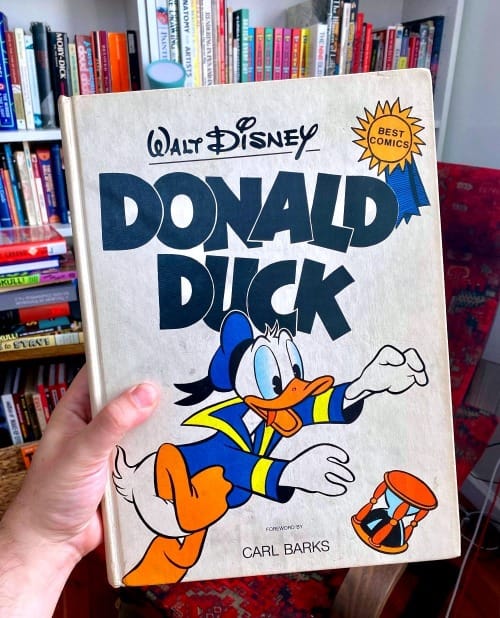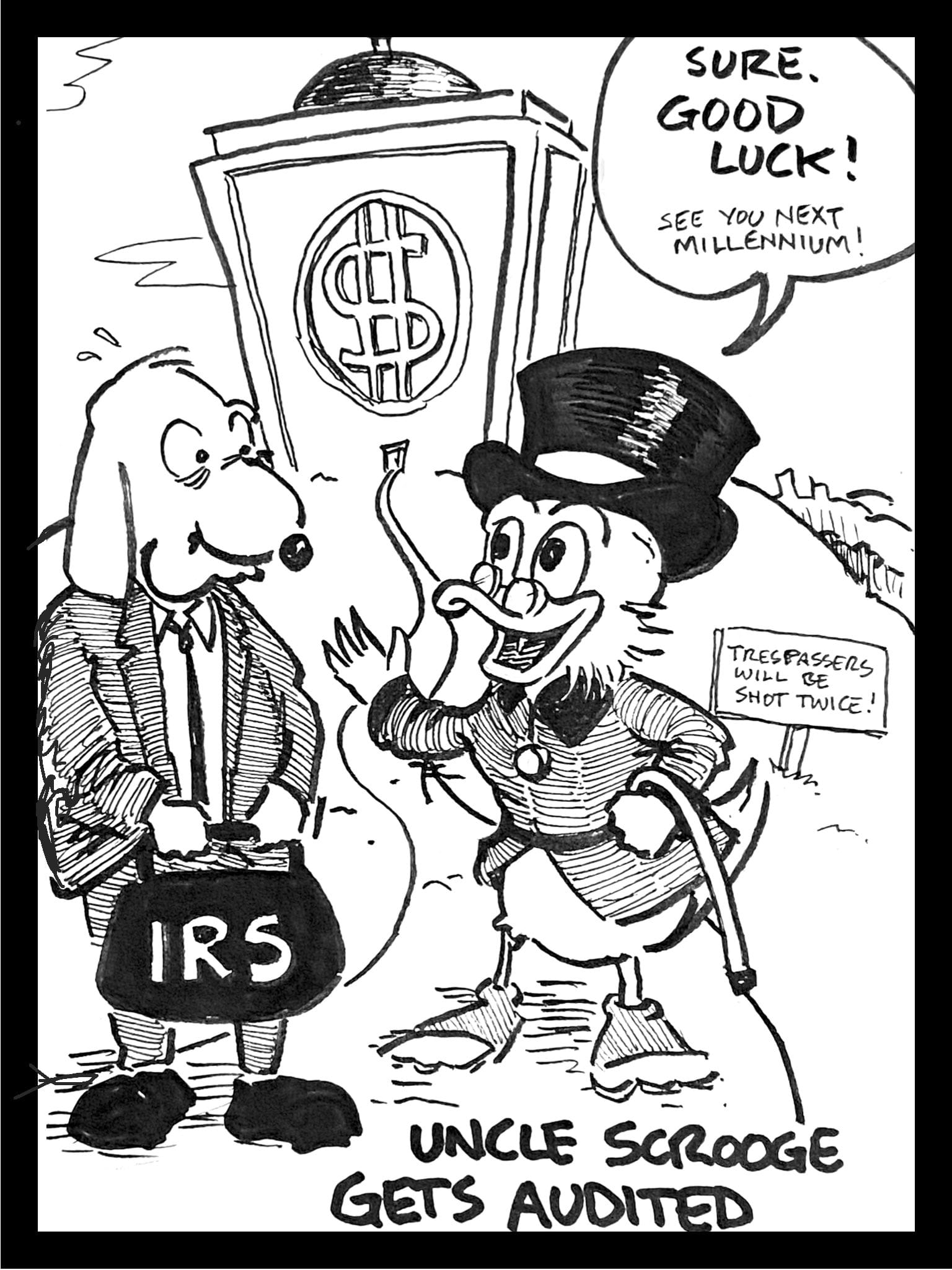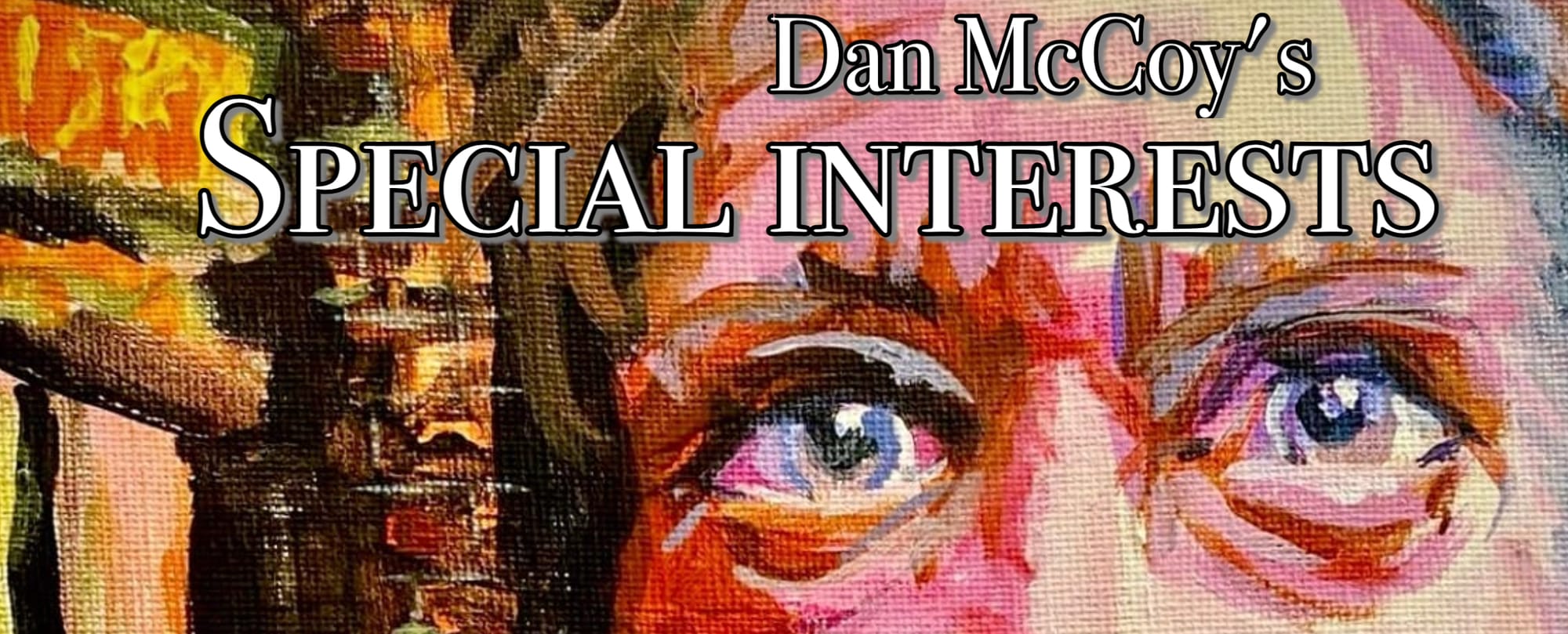Let's Take Scrooge McDuck Down a Peg or Two

I don’t have to tell you this, but the world is chock-a-block with wealthy ducks. The Aflac duck has grown fat off the lucrative and heartless insurance game. The fearsome Count Duckula owns his own castle, with plenty of ketchup money to spare. And legendary session bassist Donald “Duck” Dunn surely grew rich from copious Blues Brothers residuals.
Still, one duck towers above them all.
As we all know, the richest duck in the world is “Uncle” Scrooge McDuck. Some South Africans claim their own Flintheart Glomgold takes the crown, but he was tested and found wanting in the area of string ownership. (Editor’s note: see “The Second-Richest Duck,” Uncle Scrooge #15, September 1956 – Smilin’ Dan!)
We’ll return to that lovable duckbilled oligarch in a moment, but first I’d like to talk about my personal attachment to Mr. McDuck.
I’m a big comics fan, but unlike many of my generation, superheroes were never really my jam. I read a bunch of my older brothers’ X-Men comics (mostly the beloved Chris Claremont run) and back issues of Marvel’s delightfully weird Star Wars series (which I suppose isn’t a “superhero” title, but the differences between Luke Skywalker's powers and Jean Grey’s are mostly that Jean is less accomplished in the area of “whining about not getting to go to Toschi station to pick up some new power converters”).
My comics obsessions were more esoteric – valuable training for a lifetime of being out of step with what other people enjoy. From my brother John I inherited a love of alternative comics from the 80’s and 90’s – stuff like Peter Bagge’s Hate, Dan Clowes’s Eightball, and early Cerebus, back when it was a funny satire about a barbarian aardvark, and not a dumping ground for Dave Sim’s weird issues with women.
I was also into old newspaper strips. Dad had some Pogo and Doonsbury collections lying around – the former combined social satire and dialect wordplay with gorgeous “funny animal” drawings (like Uncle Scrooge creator, Carl Barks, Pogo’s Walt Kelly started out as a Disney animator), and the latter was a fascinating comic soap opera with a sprawling cast that aged in real time… at least it was, until Doonsbury got moved to the editorial page and Gary Trudeau started spending full, boring weeks on drawings of Dan Quayle as a feather, or whatever.
Our copy of The Peanuts Treasury was so well-loved that the cardboard hardcover flaked off in chunks. I think folks who only encountered Peanuts later on, when it was dominated by Snoopy and his bizarrely unfunny brothers, don’t quite understand its brilliance, but the first couple of decades had some of the most gorgeous, deceptively simple linework you could imagine; and back in its mid-century heyday it was truly revolutionary in the way it refused to shy away from one melancholic simple truth – kids are real assholes.
There are plenty of other alt comics and old newspaper strips I could namecheck – Love & Rockets, Frank, Raw, Li’l Abner, Krazy Kat, Thimble Theater – all bricks in the pop culture wall I was building between myself and “being a normal kid,” and I’ll probably write about some in future essays, but for now let’s get back to the very first comic I had a subscription to – Uncle Scrooge.
When I was… I dunno, six or seven, let’s say (I can’t estimate how old kids are when I meet them in the wild, and the mystery extends even to my old memories) my brother John got me a book he’d seen at “The Et Cetera Shop,” – Eureka, Illinois’s premiere secondhand store, and the top (only?) attraction worth a visit. (I love my home town, but “sleepy” implies a level of brisk activity it could only aspire to.) The book he brought home was an oversized hardcover from Abbeville Press, copyright 1978, with a cover that just said Walt Disney DONALD DUCK on it, and featuring a giant picture of a thirsty-looking Donald chasing an hourglass. A janky blue ribbon sat in the top corner, reading “BEST COMICS,” and a note at the bottom boasted a “Forward by Carl Barks.”

Back then I didn’t know it, but Barks having his name on the book was a big deal. When Carl Barks first wrote his duck comics – personally creating characters like Uncle Scrooge, Gyro Gearloose, Gladstone Gander, and more – he wasn’t allowed to sign his own work, lest the children of the world might realize that Walt Disney wasn’t personally splitting his time between running a studio, inventing a theme park, tooling around on giant hobby trains, and union-busting (his other hobby), to write comics about anthropomorphic ducks and their light adventures.
Barks only got recognition late in life, and only then because his work was SO GOOD that fans started noticing the work of the man they only knew as “the good duck artist” and tracked him down. His belated recognition led to (among other things) Disney allowing him to make and sell oil paintings of the duck characters, giving him needed late-life revenue – a marginally happier ending than those enjoyed by any number of comics creators who were never fairly compensated – look to Siegel and Schuster, creators of Superman, for one illustrative example. (Editor’s note: For more of Dan gassing on about Carl Barks, see his guest appearance on The Comics Canon podcast, Episode 201: “A Carl Barks Christmas” – Describin’ Dan!)
Anyway, as soon as I flipped through that volume, I was hooked. The janky blue ribbon was correct. These were “the best comics.” The appeal of these duck comics can be hard to describe to anyone accustomed to clear genre lines, because Barks’ duck comics are neither fish nor fowl. Okay, so they ARE fowl. But they’re neither fully “funny” or fully “adventure.” They’re light-adventure – his deceptively simple art is astoundingly adept at capturing funny gestures and expressions (see my terrible drawing of Scrooge at the end of this essay for proof of how great Barks was), and the plot details are often outlandish or silly. A typical installment might feature a trip to a lost city in the Andes where everything is square – right down to square eggs laid by square chickens, or a trip beneath the earth where blobby creatures create earthquakes with their rolling games; but within the silliness the action is played relatively straight, and the fanciful adventures are the wistful daydreams of Barks himself – a man who never traveled the world, but devotedly read National Geographic and dreamed of exotic lands.
They’re kind of like the swashbuckling adventure serials that George Lucas and Steven Spielberg mined for Raiders of the Lost Ark. In fact, Spielberg's specifically pointed to Uncle Scrooge comics as an inspiration. (Brief sidebar – Indiana Jones is ANOTHER personal fave, but any modern audience for either Scrooge or Jones’s adventure tales will have to reckon with the fact that they’re both tomb raiders. Jones does it for fortune and glory at worst, or to smash Nazis at best, and Scrooge just does it because he loves moolah, but – at their core – both characters sure do enjoy stealing from other cultures! Live long enough, and you’ll see yourself [and your silly made-up heroes] become the villain.)
Anyway, I was bitten by the duck-bug. A year or so of obsessively re-reading DONALD DUCK later, Robert (my other brother), gave me a birthday card with a homemade drawing of some superheroes on the outside, and the gift/promise of a subscription to any “amazing or azaming comic” I wanted on the inside. (In case I haven’t said it enough – Robert and John, you were amazing AND azaming older brothers, and I love you very much.) I’m sure Rob assumed I’d go for some Marvel rag, but I knew what I wanted. An upstart press called Gladstone Publishing had begun to reprint all of Carl Barks’s old duck comics, and I wanted Uncle Scrooge.
So that was my first subscription, and I kept it going until Gladstone stopped publishing duck comics when their licensing rights ran out and returned to Disney (I assume because they couldn’t bear to see anyone else make money from their IP). Gladstone switched to reprinting old EC comics like Tales from the Crypt, which I also collected until THAT license expired, and Gladstone drifted away into the great publishing house in the sky.
Meanwhile, my duck love was marginally sated by the surprise popularity of DuckTales, the Disney afternoon show with a theme song my generation can probably sing by heart. Many of the most memorable DuckTales episodes were directly adapted from Barks’s comics, but – to me – they were dumbed-down versions of the source material, adding unnecessary characters like the doofus-y “Launchpad McQuack” and “Bubba Duck,” the unforgivably irritating caveduck. So if you were wondering if I was always an insufferable snob, I think you have your answer.
These days, if you’re interested in Carl Barks, his work is more readily available than ever. Fantagraphics, the premiere alternative and reprint comics publisher, launched “The Carl Barks Library,” a series of hardcover volumes covering everything the good duck artist ever did. I acquired twenty of them over the course of a few years, before sheepishly admitting to myself that I could not continue to justify the astounding loss of shelf space, in a New York apartment.
It was a hard decision – though it’s a collection I was always a bit worried about during my single/dating years (2015-18ish). I’d imagine a woman coming back to my apartment, her eyes widening in horror as she spied twenty separate volumes with “Donald Duck” and “Uncle Scrooge” on their spines – me weakly protesting, “He’s really respected! These comics are HUGE in Denmark!”
Fortunately I married a woman who’s already aware I’m a giant child, so it all worked out.
Anyway, now that we’ve built Scrooge McDuck up, let’s live up to the title and tear him down. As I mentioned way back when, the important thing to know about Uncle Scrooge is that he’s rich. In the duck world, if you took Mark Duckerberg, Jeff Beakzos, Elon Muskovy, and Warren Bufflehead’s net worth, and crammed them all together, you’d get about a quarter of Scrooge’s giant nest egg. (I had to research those duck puns, so I sure hope some member of the Audubon Society’s busting a gut right now). He’s Duckburg’s preeminent plutocrat and the world’s most savvy business-duck.
Or IS he? (imagine a dramatic musical sting here)
I maintain that Scrooge McDuck is NOT the business genius he seems to be. My evidence for this bold and pointless claim?
#1 - His Means of Accruing Wealth.
Instead of the usual routes to obscene wealth (tech startups, flipping real estate, or inheriting it from your late father, Fred Trump), Mr. McDuck relies almost entirely on non-traditional income streams, like locating lost emerald mines or mythological treasure caches. Which is weird. Nine times out of ten, wealthy CEOs won’t abandon their day-to-day business demands for a relic-hunting jaunt to distant lands. Rarely does one email Bill Gates, and get the out-of-office reply, “Sorry, but I’m in Greece searching for Jason’s legendary golden fleece. Any non-fleece related questions will be addressed on my return.” It seems like a good way to get removed by your board of directors.
#2 - Management of Existing Wealth.
Let’s face it. Scrooge is a micromanager. Instead of focusing on the overall health of his portfolio, he obsesses over the possible loss of discrete parts of his fortune. These worries usually involve the loss of his number one dime to professional dime-coveter/witch Magica De Spell, who wants the dime for a magical wealth amulet. While the pursuit of money is a non-traditional witch goal – versus, say, dooming MacBeth or bedeviling Bugs Bunny – it’s refreshing to see an immigrant witch who’s bought so deeply into the American dream.
And if Scrooge is right to worry, and the dime is the cornerstone of his fortune, it certainly undercuts his personal reputation as a savvy business-duck. If a magic dime is all one needs for success, then we’re all ten cents away from glory.
Meanwhile, Scrooge allows himself to be further removed from day-to-day money management by distractions like the aforementioned dick (and string) measuring contest with multiplujillion-and-nine-obsquatumatillionaire, Flintheart Glomgold. During their previously-referenced first encounter, they purportedly counted their entire respective fortunes (highly unlikely, since counting multiplujillion dollars would take obsquatumatillion minutes in and of itself) before McDuck triumphed on the basis of extra string. This is a tremendous waste of time. Just check your account balances online, guys.
Speaking of dick-measuring, let’s talk about the famed money bin – perhaps the most egregious example of Scrooge’s bizarre cash management. Instead of reinvesting in a balanced portfolio of stocks and bonds, Mr. McDuck has instead decided to entomb his fortune in a large concrete monument to his own wealth. Here’s an idea, “Uncle” Scrooge. How about a BANK? At least there, your money would be earning interest. Not much, at today’s rates, but at least your wealth would be working for you, and you could stop paying property taxes on a giant cash cube, which I assume is an absolute bitch to vacuum.
A bank boasts other advantages, like “security.” Banks are decentralized and insured against theft. Meanwhile, you (a duck who is constantly shadowed by an entire family of humanoid beagles whose sole business is thievery) have decided to house your net worth in one centralized location, atop an open hill.
What’s more, this “money bin” is not made of reinforced steel, but easily-penetrated and inflexible concrete, a building material already subject to the dangers of sinkholes, earthquakes, or the normal wear and tear of housing a square mile of currency. At the least, don’t advertise that it’s full of money by putting a big dollar sign on the side. Cover the side with centipedes, or gunk from the kitchen sink, or pictures of J.D. Vance. You know, stuff that discourages attention, rather than shouts “come steal me.”
And WHY has Mr. McDuck settled on this whimsical way of storing his fortune? Because he enjoys swimming in it.
Let’s ignore that this is a nearly-sexual way to enjoy money. Let’s also forget the countless diseases Scrooge must be risking by bathing in currency that’s been handled by a million hands. Even if these were not concerns, “Because I want to swim in it,” is not the message you want to send to stockholders about your wealth management choices.
#3 - Misrepresentation of Wealth.
My final point – take a moment to set this newsletter aside and google an image of the money bin. I’ll wait here.
Did you see what’s inside? Approximately 90 percent of the bin’s volume is coins. While it is entirely possible that this so-called “Uncle” Scrooge McDuck is the richest duck in the world by cubic feet, it appears that’s only the case because he’s chosen to fill his money fondle-palace with currency of low denominations. If you have a dollar, and I have 100 pennies, I am not richer than you. Perhaps it's just that the coins are all at the top, the lower levels are pure diamonds, and my accusations are unfounded, but one must admit – with all of Scrooge’s liquid wealth stored in this format, no one may confidently estimate his net worth. Perhaps it’s an innocent coin fetish, but it makes his claim on the “richest duck” title highly suspect.
In other words: release the tax returns.

For earlier posts, check out the archive. In my other life, I’m a podcaster. Listen to my show The Flop House, here. In my other other life, I’m an Emmy-winning comedy writer. If you’re looking to staff, get in touch! And if you love the newsletter, you can always consider tipping me, by enrolling in the paid tier!
